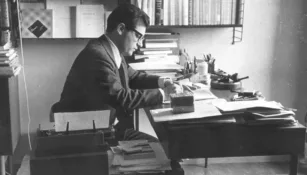RECENSIONI / Bruno Batista Rates /

First published in Italian in 2013, followed by a virtually simultaneous translation into French (with a preface by Frédéric Worms) and by a recent translation into German, Bergson and German philosophy 1907-1932, the result of the doctoral thesis of Caterina Zanfi, is certainly one of the greatest contributions to Bergsonian studies in the last ten years. The author had already released in 2009 a significant study, entitled Bergson, la tecnica, la guerra (Bononia University Press), but her second book goes further. Such enthusiasm, we hope, will be justified through this review, which will not prevent us from raising some points that we consider problematic in the book, that, of course, in the best spirit of academic comradeship.
With a clear style, interdisciplinary approach and an impressive bibliographical research, the book aims to «reconstitute the transformations of Bergson’s philosophy» (p. 9, emphasis added) that occurred in the 25 years that separate Creative Evolution (EC from now on) from The Two Sources of Morality and Religion (DSMR from now on), in relation to the debates of the culture-philosophical German scene of the period and, more specifically, those in which Bergson is mobilized or directly engages. It is true that there is an essentially anti-Bergsonian dimension in this endeavor, especially if we consider Bergson’s reading recommendations in 1911 at the conference «Philosophical Intuition», although the author highlights Bergson’s concern at the same text with the preliminary work that consists «to compose a philosophy with what it is not and to reconnect it with what was around it» (p. 10, Bergson’s quotation). In this sense, Caterina Zanfi follows up the research on the German reception of the philosopher of duration previously conducted by Gregor Fitzi, Arnaud François, Olivier Agard and Jean-Louis Vieillard-Baron, as well as by Wolfhart Henckemann and the pioneering studies of Rudolf W. Meyer and Günther Pflug. However, the term «reception» gains another consistency with Zanfi, since what is at stake is not only the manner in which the German philosophers of the first decades of the twentieth century read Bergson, but also how such readings, in a kind of «ricochet effect» (p. 18), decisively influenced Bergson’s writing. While following his reception in Germany, we see a «reception of the reception» emerge on the French bank of the Rhine, and so on, so that the boundaries between «German philosophy» and «French philosophy» (Bergsonian) widen considerably, to the point of sometimes almost becoming the same, despite the withdrawal at a dramatic moment in European history, the First World War. And it is this «back-and-forth movement» (p. 18), this «labyrinth of mirrors» (ibid.), inspired by the idea of «cultural transfer» forged by Michel Espagne (p. 12), but also by the sociology of knowledge of Pierre Bourdieu (ibid.), what makes the book convey the idea of a history of philosophy that is read mainly from its «effects», not so much to neutralize the «truth» or «originality» of each doctrine, but to reinforce the idea that thinking is, above all, «thinking with», in an intense dialogue between interlocutors who, in turn, are not out of the place, community nor the time in which they live. This endows the research with a further ambition, namely, «to assign a new dimension to Bergson’s work in the history of European philosophy» (p. 280), a task that seems to be possible through the recognition of the originality of the concept of life as is thought by the Frenchman.
…

